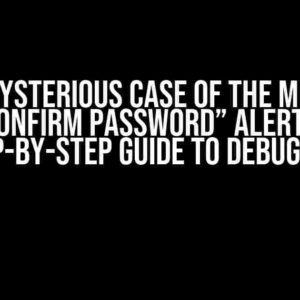Cryptography has become an essential aspect of modern web development, and understanding how to implement crypto hash functions is crucial for ensuring the security of your applications. In this article, we’ll explore how to implement crypto hash functions in Node.js 22 and Angular 18, providing you with a comprehensive guide to get you started.
What is Crypto Hashing?
Crypto hashing is a one-way encryption process that takes input data of any size and returns a fixed-size string of characters, known as a hash. This hash is unique to the input data and cannot be reversed or decrypted. Crypto hashing is commonly used for password storage, data integrity, and digital signatures.
Why Use Crypto Hashing?
There are several reasons why you should use crypto hashing in your applications:
- Password Storage: Storing passwords as plain text is a significant security risk. Crypto hashing allows you to store passwords securely, making it virtually impossible for hackers to access them.
- Data Integrity: Crypto hashing ensures that data remains unchanged during transmission or storage. If the data is tampered with, the hash will not match, indicating that the data has been compromised.
- Digital Signatures: Crypto hashing enables the creation of digital signatures, which ensure the authenticity and integrity of digital messages, documents, and software.
Implementing Crypto Hashing in Node.js 22
To implement crypto hashing in Node.js 22, we’ll use the built-in `crypto` module. This module provides a range of cryptographic functions, including hash algorithms.
Installing Required Modules
Before we begin, make sure you have Node.js 22 installed on your system. Create a new project directory and navigate to it in your terminal or command prompt.
mkdir crypto-hash-example
cd crypto-hash-example
npm init -y
Creating a Crypto Hash Function
Create a new JavaScript file called `crypto.js` and add the following code:
const crypto = require('crypto');
function hashData(data) {
const hash = crypto.createHash('sha256');
hash.update(data);
return hash.digest('hex');
}
module.exports = { hashData };
In this example, we’re using the SHA-256 hash algorithm to generate a hash from the input data. You can modify the algorithm to use other hash functions, such as MD5, SHA-1, or BLAKE2b.
Using the Crypto Hash Function
Create a new JavaScript file called `app.js` and add the following code:
const { hashData } = require('./crypto');
const data = 'Hello, World!';
const hash = hashData(data);
console.log(`Hash: ${hash}`);
Run the `app.js` file using Node.js:
node app.js
This will output the SHA-256 hash of the input data.
Implementing Crypto Hashing in Angular 18
To implement crypto hashing in Angular 18, we’ll use the `crypto-js` library, which provides a range of cryptographic functions, including hash algorithms.
Installing Required Modules
Install the `crypto-js` library using npm or yarn:
npm install crypto-js
Creating a Crypto Hash Service
Create a new file called `crypto-hash.service.ts` and add the following code:
import * as crypto from 'crypto-js';
@Injectable({
providedIn: 'root'
})
export class CryptoHashService {
hashData(data: string): string {
return crypto.SHA256(data).toString();
}
}
In this example, we’re using the SHA-256 hash algorithm to generate a hash from the input data. You can modify the algorithm to use other hash functions, such as MD5, SHA-1, or BLAKE2b.
Using the Crypto Hash Service
Create a new component or service that will utilize the `CryptoHashService`. For example, let’s create a new component called `app.component.ts`:
import { Component } from '@angular/core';
import { CryptoHashService } from './crypto-hash.service';
@Component({
selector: 'app-root',
template: `
Hash: {{ hash }}
`
})
export class AppComponent {
hash: string;
constructor(private cryptoHashService: CryptoHashService) { }
ngOnInit(): void {
const data = 'Hello, World!';
this.hash = this.cryptoHashService.hashData(data);
}
}
In this example, we’re using the `CryptoHashService` to generate a SHA-256 hash of the input data.
Best Practices for Implementing Crypto Hashing
When implementing crypto hashing, it’s essential to follow best practices to ensure the security and integrity of your applications:
- Use a secure hash algorithm: Choose a hash algorithm that is widely accepted and considered secure, such as SHA-256 or BLAKE2b. Avoid using weak hash algorithms, such as MD5 or SHA-1.
- Salt your hashes: Salting your hashes adds an extra layer of security by making it more difficult for attackers to use precomputed tables (rainbow tables) to crack the hash.
- Use a sufficient work factor: Use a sufficient work factor (iteration count) to slow down the hashing process, making it more resistant to brute-force attacks.
- Store hashes securely: Store hashes securely, using a secure storage mechanism, such as a Hardware Security Module (HSM) or a secure database.
- Avoid using plaintext passwords: Never store plaintext passwords. Always hash and store passwords securely.
| Hash Algorithm | Security | Performance |
|---|---|---|
| SHA-256 | High | Medium |
| BLAKE2b | High | Fast |
| MD5 | Low | Fast |
| SHA-1 | Low | Medium |
Conclusion
In this article, we’ve explored the world of crypto hashing, covering the basics of crypto hashing, why it’s essential, and how to implement it in Node.js 22 and Angular 18. By following best practices and using secure hash algorithms, you can ensure the security and integrity of your applications.
Remember, cryptography is a complex topic, and it’s essential to stay up-to-date with the latest developments and advancements in the field. By doing so, you can ensure that your applications remain secure and protected from potential threats.
Happy coding!
Here are the 5 questions and answers about “Implementing crypto hash – Node.js 22 – Angular 18”:
Frequently Asked Questions
Get the scoop on implementing crypto hash in Node.js 22 and Angular 18 with these frequently asked questions!
What is the purpose of implementing crypto hash in Node.js 22 and Angular 18?
Implementing crypto hash in Node.js 22 and Angular 18 serves as a security measure to protect sensitive data by creating a digital fingerprint of the data. This ensures data integrity, authenticity, and confidentiality, making it difficult for unauthorized parties to tamper with or access the data.
Which crypto hash algorithm is recommended for use in Node.js 22 and Angular 18?
The SHA-256 (Secure Hash Algorithm 256) is a widely recommended and secure crypto hash algorithm for use in Node.js 22 and Angular 18. It produces a 256-bit hash value, providing a high level of security and making it suitable for various applications, including password storage and data integrity verification.
How do I implement crypto hash in Node.js 22?
To implement crypto hash in Node.js 22, you can use the built-in `crypto` module, which provides a range of cryptographic functions, including hash functions. Simply require the `crypto` module, create a hash object using the desired algorithm (e.g., `crypto.createHash(‘sha256’)`), and then update the hash object with the data to be hashed. Finally, obtain the hash value using the `digest()` method.
Can I use crypto hash in Angular 18 for client-side data encryption?
Yes, you can use crypto hash in Angular 18 for client-side data encryption. However, keep in mind that client-side encryption has its limitations and potential risks, such as exposing encryption keys. A more secure approach would be to perform encryption and decryption on the server-side (Node.js 22) and use HTTPS to protect data in transit.
Are there any performance considerations when implementing crypto hash in Node.js 22 and Angular 18?
Yes, when implementing crypto hash in Node.js 22 and Angular 18, performance considerations are crucial. Hash operations can be computationally expensive, especially with large data sets. To optimize performance, use efficient algorithms, consider using worker threads in Node.js, and leverage browser APIs (e.g., Web Cryptography API) in Angular 18. Additionally, consider caching hash values and using incremental hashing techniques to minimize computational overhead.









